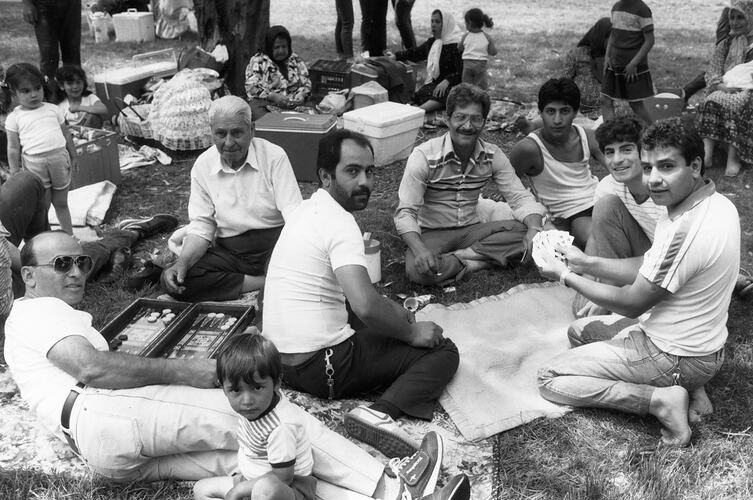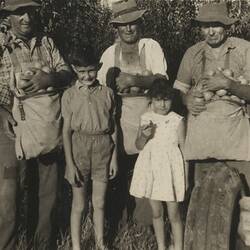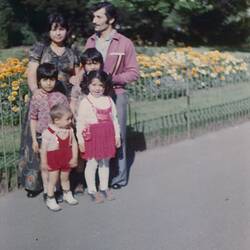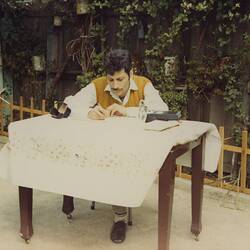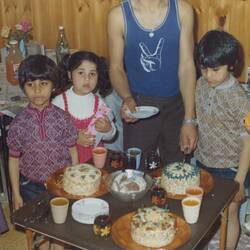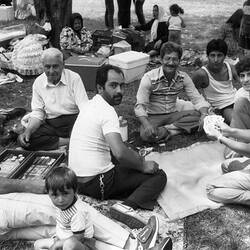Summary
Wafa Fahour migrated to Melbourne with her family from Tripoli, Lebanon in 1970 where her uncle and aunt were already settled.
Wafa Fahour migrated to Australia in 1970 with her parents and siblings from Tripoli, Lebanon, via Cyprus, to Melbourne. Wafa's uncle and aunt already lived in Melbourne and they told her parents about Australia as 'a lucky country, especially for kids'.
When they settled in Melbourne, Wafa's parents first wanted a good education for their children but at that time there was no Islamic school. Wafa and her siblings were enrolled at St Bridget's Catholic School in North Fitzroy. Nuns were their teachers. She recalls that 'Her father encouraged them to take part in church activities, to respect other faiths, and we even went regularly to church as part of the school curriculum'. Then Wafa attended the Preston Girls' High School. There a Lebanese Christian teacher formed the School's Arabic Committee in which Muslim and Christian parents took part including Wafa's father.
Through schooling, Wafa and her sisters and brothers learnt English. In particular, Wafa's brother Ahmed learned English quickly, translated letters and news and explained them to the family. The family lived in Carlton and Wafa's parents ran a business in Brunswick, a shop called Damascus sweets in late 1970s. Wafa recalls: 'My parents worked hard while also supporting the Muslim community. The Muslim community still was a small one. Its members 'stuck together' because of the same ethnic language with little or no English.
For most Muslims the priority was learning English and integration into society. While community members learned English mostly at the workplace, Muslims of different ethnic backgrounds and various languages communicated amongst themselves with some English words, some Arabic and Turkish words using also hand-sign-language.' Wafa remembers: 'When we arrived in Melbourne, we hadn't seen any mosques. Gatherings in private houses among the Arab Muslims were popular and always welcomed people with open arms. When a picnic was held in the park more than 10 cars followed each other like 'camel train'. 'As migrants we were educated to respect the law of the country [Australia] and to do good deeds - always! Loving the country we live in is part of the Muslim faith. During the 1980s, people in Arabic group were together regardless of the Muslim sects and we never asked which religion they adhered. We had Christians with us - friendship was most important. Although we had different lifestyles, it didn't prevent us to cherishing friendship'.
Wafa reflects: 'Friendship is like a rainbow - it shines in all colours and includes diverse people. I met Jews, Christians, Muslims and people of other faiths or those without religious belief. I built a good neighbourhood and friendship with all of them. Love doesn't like hate... In Islam a good neighbourhood also implies various nationalities and races, occupations and classes and cultural and religious communities, living next to one another. Wearing a hijab also should not be an issue in a culturally and religiously diverse society. However Muslim women, including those born in Australia, often hear nonsense - 'go back to your country.'
Today Wafa Fahour is the Operations Manager at the Islamic Museum of Australia, which aims establish a leading cultural institution to showcase and preserve Islamic arts, history, culture and heritage and to help people cultivate their interest about Islam and build intercultural bridges.
Based on Dzavid Haveric's interview with Wafa Fahour 2017.
More Information
-
Keywords
-
Authors
-
Article types
